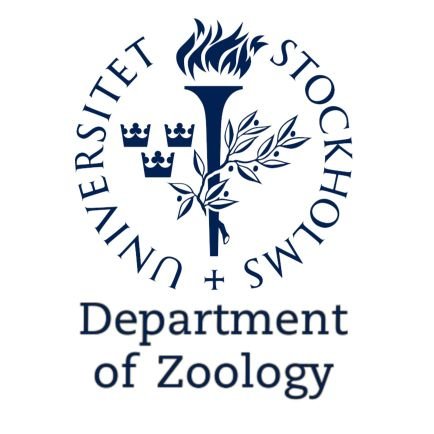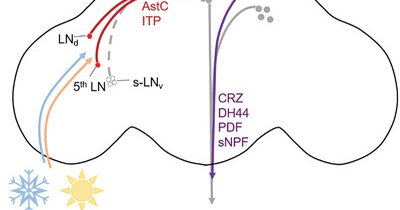
Würzburg FlyNeurogenetics
@FlyNeuro
Followers
332
Following
54
Media
10
Statuses
120
Neurobiology and Genetics Charlotte Förster Christian Wegener Circadian Rhythms Learning and Memory Vision Neuroanatomy Neuropeptides Biogenic amines
Würzburg, Germany
Joined July 2018
Check out our revised manuscript on the Drosophila circadian clock @FlyWireNews connectome. Packed with more neurons and analyses @nils_reinhard @FlyNeuro
https://t.co/hEpG2eluRi
1
13
89
If you are interested in brains and beers, and hang around in Würzburg on Wed next week, here's something for you:
0
3
13
New paper 🚨 from the lab in collaboration with @JPPaluzzi lab. Postdoc @gera_jayati's first project from the lab on the discovery of the receptor for the fly anti-diuretic hormone, ITP. Check out the 🧵for more info (1/n)
biorxiv.org
Insects have evolved a variety of neurohormones that enable them to maintain their nutrient and osmotic homeostasis. While the identities and functions of various insect metabolic and diuretic...
6
14
44
Interested in Unpaired group of proteins (Upds) in flies? Check out our latest review on Leptin and cytokine like signaling in Drosophila!! A big thanks to @zandawala for his constant support and guidance 🥂🎉🎊
New paper 🚨 from the lab! Our review on #leptin and #cytokine like signaling in #Drosophila is out now in Molecular and Cellular Endocrinology. Huge congrats to co-author @gera_jayati for her first paper from the lab. https://t.co/POx0V9BAyV
3
2
17
Congratulations to @philip_suess for successfully defending his thesis titled "Unraveling the regulatory mechanisms of pupal diapause termination". Many thanks to the opponent Christian Wegener @FlyNeuro and the committee Noushin Emami, Martin Andersson and Richard Walters.
0
1
10
Controlling arms and legs requires feedback from position/movement sensors (proprioceptors). But how is feedback flexibly tuned to match behavior? In our new preprint, we reveal how the motor system tunes proprioceptive feedback in Drosophila 🧵 https://t.co/RDdBWEHXq2
2
39
164
New lab preprint on modulation of #Drosophila insulin producing cells (IPCs). How do single-cell transcriptomic analyses compare with Gal4-based expression mapping? Are IPCs really a homogenous population of 14 cells? 🧵 (1/n)
biorxiv.org
Insulin plays a critical role in maintaining metabolic homeostasis. Since metabolic demands change momentarily, insulin release needs to be constantly adjusted. These adjustments are mediated via...
1
4
21
Preprint 🚨 Everybody, put your cakes down! It’s time to talk about aminergic and peptidergic modulation of Insulin-Producing Cells (IPCs) in Drosophila. I am over the moon to share our preprint today! 🤩 https://t.co/lhlV80klg6 (1/n)
biorxiv.org
Insulin plays a critical role in maintaining metabolic homeostasis. Since metabolic demands change momentarily, insulin release needs to be constantly adjusted. These adjustments are mediated via...
4
14
70
Check out this new preprint from @jan_ache and @zandawala labs on #Drosophila insulin-producing cells. See the 🧵 by co-first author @TinaHeld4 for more details.
Very excited to share our latest pre-print on the modulation of Insulin-Producing Cells in #Drosophila, conveniently unpacked for you in this🧵by @TinaHeld4, who spearheaded the project alongside @rituja14 and our collaborator & neighbor @zandawala. -->
0
0
9
Very excited to share our latest pre-print on the modulation of Insulin-Producing Cells in #Drosophila, conveniently unpacked for you in this🧵by @TinaHeld4, who spearheaded the project alongside @rituja14 and our collaborator & neighbor @zandawala. -->
biorxiv.org
Insulin plays a critical role in maintaining metabolic homeostasis. Since metabolic demands change momentarily, insulin release needs to be constantly adjusted. These adjustments are mediated via...
Preprint 🚨 Everybody, put your cakes down! It’s time to talk about aminergic and peptidergic modulation of Insulin-Producing Cells (IPCs) in Drosophila. I am over the moon to share our preprint today! 🤩 https://t.co/lhlV80klg6 (1/n)
1
7
47
Sign-up to present in our symposium (16-17) "Neuropeptide signalling in insects: diverse and pleiotropic actions" @ice2024kyoto_jp in Kyoto, Japan. We have an exciting line-up of speakers: @JPPaluzzi @laurabduvall @jan_ache and others not on X.
ice2024.org
【NEW】 List of updated symposium & symposium number Plea
1
5
26
The proceedings of the 7th biennial meeting of the North American Society for Comparative Endocrinology will be published as a special issue in General and Comparative Endocrinology. Deadline to submit is 12/31/2023. More info here: https://t.co/Km06dwOkgn
0
4
7
Check out this new preprint on the Drosophila clock connectome by @zandawala and Helfrich-Förster labs from the department.
Let's try this again - look's like twitter can't handle the video 😂. Really excited to share the lab's first Drosophila paper and it's a big one. Check out our preprint https://t.co/Z1oI59uICG where we present the complete neural connectome of an animal circadian clock
0
7
24
We all are happy and proud and congratulate Francesca Sara Colizzi for her great defense of her PhD thesis on the characterization of the circadian clock and neuropeptides in aphids. Well done dottoressa Sara and all the best for the PostDoc! @GSLSUniWue @Uni_WUE
0
1
10
Data suggest that the circadian clock aligns daily oscillations of transport lipids to the anabolic siesta phase, with a strong influence of light on phase and modality. Check out here open access: https://t.co/umoP3NDtXV
0
0
0
Our SFB1047 "Insect timing" offered a perfect umbrella to cooperate with the Pharmaceutical Biology in the Biocenter. Combined expertise allowed us to characterise the daily cycling of transport #lipids and their dependence on the #circadian clock in #Drosophila.
1
0
3
For more beautiful neuroanatomical staining, check out the paper.
1
0
0
Helfrich-Förster lab on a roll. Check out this new paper by PhD student Giulia Manoli in collaboration with @zandawala and Yoshii labs on clock-related proteins and neuropeptides in Drosophila littoralis, a model for diapause.
onlinelibrary.wiley.com
We show that the circadian clock neurons of Drosophila littoralis, a highly photoperiodic species, exhibit important differences to those of Drosophila melanogaster in respect of neuropeptide...
2
8
21








